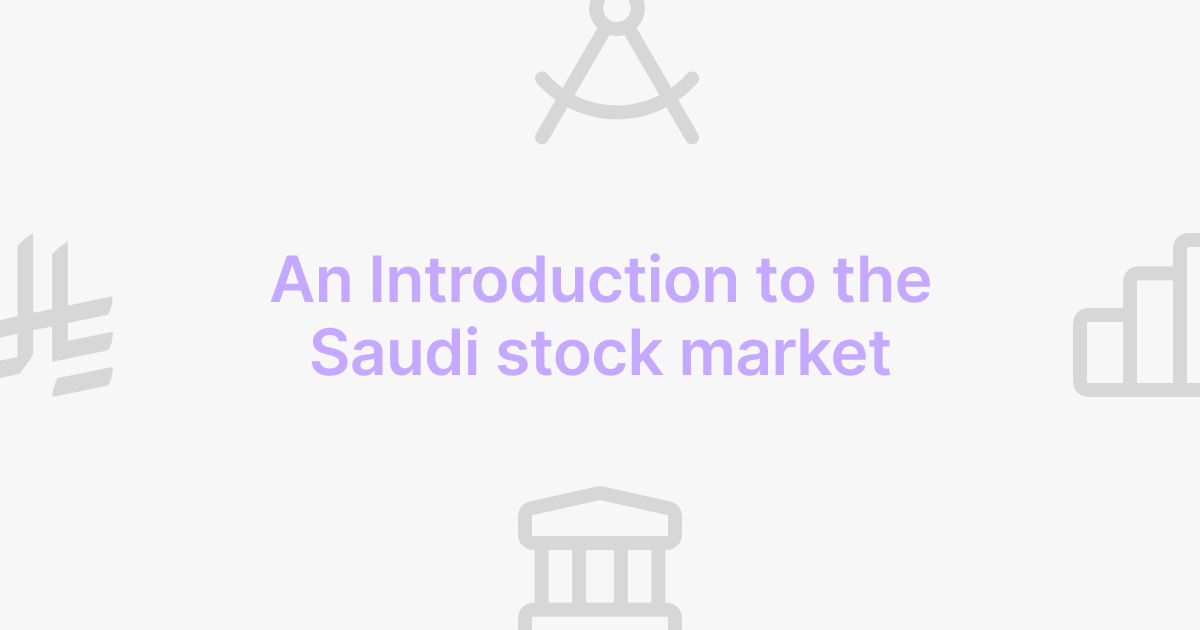A Comprehensive Introduction to Stock Markets in Saudi Arabia
With Saudi Arabia’s rapid economic development and growing awareness about saving and managing money wisely, the stock market has become a key option for individuals seeking structured ways to grow their wealth.
Stock markets provide both individuals and institutions with opportunities to invest in financial instruments such as shares and funds within a regulated and supervised trading environment. While the concept can seem complex at first, understanding the fundamentals is an essential step toward making informed financial decisions.
Learning how the market operates, understanding demand types, and recognizing its main components can help investors begin their journey confidently, avoiding uncalculated moves or reliance on unreliable sources.
This article presents a comprehensive introduction to stock markets, focusing on the KSA stock market. We will explore the basic concepts, market mechanisms, key sectors and companies, steps to start investing, available analysis tools, and practical tips for beginners to plan and learn with a calculated approach.
What Are Stock Markets?
Stock markets are organized environments where financial instruments are bought and sold, including:
- Shares: Represent partial ownership in a listed company.
- Bonds: Debt instruments issued by companies or governments to raise capital.
- Investment funds: Collective investment tools managed by specialized entities.
- Derivatives: Financial contracts based on underlying assets such as shares or commodities.
The role of the stock market goes beyond facilitating transactions. It also ensures transparency, protects investors legally, and regulates the relationships between market participants, such as issuers, investors, and brokerage firms.
How Do Financial Markets Operate in Saudi Arabia?
1. Saudi Exchange (Tadawul)
Saudi Exchange (Tadawul) runs the stock market in Saudi Arabia. It is the only authorized platform for trading securities in the Kingdom. Tadawul enforces marketplace rules and promotes transparency. The exchange operates under the supervision of the Capital Market Authority.
2. Main Components of the Saudi Market
Understanding investment in Saudi Arabia begins with these core elements
- Shares: These range from large-cap companies such as Aramco and SABIC to smaller growth firms.
- Market indices: The Tadawul All Share Index (TASI) reflects overall market performance and acts as a benchmark.
- Brokerage companies: Licensed firms that place orders and connect investors to the market.
- Order types: Investors use market orders, limit orders, and other order types via electronic trading platforms.
3. Trading Hours
- Trading days: Sunday to Thursday
- Main session: 10:00 a.m. to 3:00 p.m.
- Pre-opening session: 9:30 a.m. to 10:00 a.m., when orders may be placed but not executed
- Official weekend: Friday and Saturday
Key Sectors and Companies in the Saudi Market
The Saudi Exchange lists companies across a variety of sectors, each with unique drivers and sensitivities:
Financial Sector
Includes banks, insurance companies, and non-banking financial institutions. It is one of the largest sectors in terms of market value and liquidity.
Energy Sector
Led by Saudi Aramco, this sector has a significant influence on the market index due to its size and global relevance.
Petrochemicals Sector
Highly dependent on oil and gas prices, with major players such as SABIC shaping the sector’s performance.
Telecommunications Sector
Home to internet and telecom service providers, this sector offers relative stability due to the essential nature of its services.
Healthcare Sector
Covers hospital operators, pharmaceutical companies, and medical equipment manufacturers.
Real Estate and Building Materials
This group includes real estate developers, construction firms, and cement and other material producers, which are closely linked to the Saudi real estate market.
Each sector responds differently to economic, political, and social events, influencing the performance of its listed companies.
Steps to Start Investing in the Saudi Market
Starting your journey in the Saudi stock market is straightforward, but it requires awareness and a clear understanding of basic mechanisms:
1- Open an Investment Account
This is done through a licensed brokerage company. The process requires a national ID, bank account details, and other documents. Many firms offer fully digital account opening.
2- Choose a Trading Platform
Brokerage firms provide online platforms and mobile applications for monitoring the market and placing orders.
3- Fund Your Account
Transfer money from your bank account to your investment account before trading.
4- Select Financial Instruments
Research companies and sectors, review financial data, and monitor relevant news before deciding.
5- Execute the Trade
Place buy or sell orders via your trading platform. Transactions are completed once a matching counterparty is found.
6- Monitor Your Portfolio
Review performance regularly, assess returns and risks, and adjust holdings when necessary.
Analysis Tools for Understanding the Market
Informed investing relies on two main forms of analysis:
1. Fundamental Analysis
Evaluates a company’s value based on:
- Financial statements (profits, revenues, expenses)
- Growth rates
- Capital structure
- Dividend policy
- Broader economic conditions
This approach helps investors determine whether a share is overvalued or undervalued relative to its intrinsic worth.
2. Technical Analysis
Focuses on price patterns and market trends using tools such as:
- Moving averages
- Momentum indicators
- Support and resistance levels
Technical analysis is often used for short-term price forecasting, without assessing the company’s financial fundamentals.
Practical Tips for Beginner Investors
Entering the market requires awareness rather than advanced expertise:
- Learn before you invest: Use credible educational sources and understand local regulations.
- Start small: Avoid committing large amounts at the outset.
- Diversify: Spread investments across different sectors and asset classes.
- Avoid rushing decisions: Take time to analyze before placing orders.
- Define your objectives: Clarify whether you seek long-term growth or stable income.
- Track economic developments: Global and domestic events can impact the market.
- Keep records: Review your trading history to refine your approach.
- Accept the possibility of loss: Market downturns are part of the investment cycle.
Conclusion
Stock markets are a powerful tool for building wealth and diversifying income sources. In Saudi Arabia, Tadawul offers a well-regulated and transparent environment for investors to access various instruments and sectors.
However, every investment decision should be based on independent analysis and a clear understanding of market dynamics. There are no guarantees of profit, and investors should always assess risks and commit to ongoing learning.
Disclaimer: All information provided is for educational and awareness purposes only and does not constitute a recommendation or invitation to make any investment decision. Past performance is not indicative of future results. Please consult your financial advisor before making any decisions.
Derayah Financial is licensed by the Capital Market Authority under License No. 27-08109 dated 19/06/1429 H (23 June 2008).
Frequently Asked Questions ( FAQs)
1- What is the Saudi stock market?
The Saudi stock market (Tadawul) is the official platform for trading shares, sukuk, and bonds in the Kingdom. Regulated by the Capital Market Authority, it is the largest in the region and plays a central role in attracting investment and supporting economic growth.
2- How does the stock market work?
It operates by allowing the purchase and sale of shares in listed companies. Prices fluctuate based on supply and demand and company performance. Trading takes place through licensed brokerage firms, offering diverse investment options for individuals and institutions.


